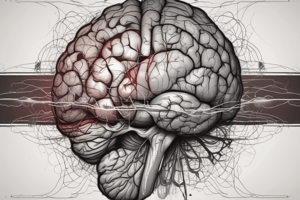Podcast
Questions and Answers
Which type of head trauma is usually associated with frontal and temporal damage, including coup and contre-coup injuries?
Which type of head trauma is usually associated with frontal and temporal damage, including coup and contre-coup injuries?
- Diffuse axonal injury
- Concussion
- Intra cranial hematoma
- Cortical contusion and laceration (correct)
Which type of head trauma may result in transient alteration of consciousness without structural damage and transient disturbance in neuronal function?
Which type of head trauma may result in transient alteration of consciousness without structural damage and transient disturbance in neuronal function?
- Cortical contusion and laceration
- Diffuse axonal injury
- Concussion
- Secondary brain damage (correct)
Which type of head trauma can range from mild confusion to deep coma and is associated with acceleration/deceleration and shearing injury?
Which type of head trauma can range from mild confusion to deep coma and is associated with acceleration/deceleration and shearing injury?
- Cortical contusion and laceration
- Diffuse axonal injury (correct)
- Concussion
- Cerebral ishaemia
Where is an extradural hematoma located and what is the source of bleeding?
Where is an extradural hematoma located and what is the source of bleeding?
Which CT finding is associated with traumatic brain radiology and may indicate cerebral ischemia or infection?
Which CT finding is associated with traumatic brain radiology and may indicate cerebral ischemia or infection?
Flashcards are hidden until you start studying
Study Notes
Types of Head Trauma
-
Coup-Contrecoup Injury
- Typically linked to frontal and temporal lobe damage.
- Involves initial impact (coup) and rebound injury (contrecoup).
-
Concussion
- Causes transient alteration of consciousness.
- Does not necessarily involve structural damage; affects neuronal function temporarily.
-
Diffuse Axonal Injury (DAI)
- Can vary from mild confusion to deep coma.
- Generally results from acceleration or deceleration forces along with shearing injuries.
Extradural Hematoma
- Located between the dura mater and the skull.
- Source of bleeding often comes from torn arteries, typically following skull fractures.
CT Findings
- Important finding includes evidence of cerebral ischemia or infection.
- May present as areas of abnormal density or enhancement on CT scans, indicating underlying injury.
Studying That Suits You
Use AI to generate personalized quizzes and flashcards to suit your learning preferences.




